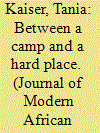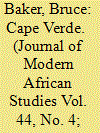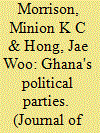|
|
|
Sort Order |
|
|
|
Items / Page
|
|
|
|
|
|
|
| Srl | Item |
| 1 |
ID:
075218


|
|
|
|
|
| Publication |
2006.
|
| Summary/Abstract |
Drawing on qualitative research with refugees in and outside formal settlements, this article challenges characterisations of Uganda's UNHCR-supported refugee settlement system as un-problematically successful. It shows that by denying refugees freedom of movement, the settlement system undermines their socio-economic and other rights. Refugees who remain outside the formal system of refugee registration and settlement are deprived of the refugee status to which they are entitled under international law. The article questions the conventional opposition between refugees living in and out of refugee settlements in the Ugandan context, revealing a more complex and interconnected dynamic than is often assumed. It suggests that those refugees with some external support may be able to escape the confines of remote rural settlements, where refugee agricultural livelihoods are seriously compromised by distance from markets, unfavourable climatic conditions, exhausted soil and inadequate inputs. It argues that refugee livelihoods face more rather than fewer challenges as exile becomes protracted, and concludes that the government and UNHCR's Self Reliance Strategy (SRS) has not yet managed to overcome the contradiction inherent in denying people freedom of movement, without supporting them effectively to meet their needs in the places to which they are restricted.
|
|
|
|
|
|
|
|
|
|
|
|
|
|
|
|
| 2 |
ID:
075215


|
|
|
|
|
| Publication |
2006.
|
| Summary/Abstract |
This article examines the substance behind the claim that Cape Verde, a small archipelago state off the west coast of Africa, is the best country in Africa for political rights and civil liberties. Based on interviews conducted with 22 key informants in government, the judiciary, the legislature and civil society, it explores the electoral process, the political parties, the functioning of the National Assembly, civil and political rights, the judicial system, civil society and economic equality. It finds that Cape Verde's unique geography and history have played a key role in facilitating good governance, and an open and non-violent society that values the real political gains of 1991. However, democracy has not yet eradicated either gender discrimination, dependence on the diaspora or poverty.
|
|
|
|
|
|
|
|
|
|
|
|
|
|
|
|
| 3 |
ID:
075219


|
|
|
|
|
| Publication |
2006.
|
| Summary/Abstract |
This paper analyses Ghanaian electoral geography and its accompanying political party variations over the last decade. After re-democratisation in the early 1990s, the Fourth Republic of Ghana has successfully completed multiple elections and party alternation. Due to its single-member-district-plurality electoral system, the country has functioned virtually as a two-party system, privileging its two major parties - the NDC and the NPP. However, close examination of election results in the last parliamentary and presidential elections reveals that notwithstanding the two-party tendency, there is a dynamic and multilayered aspect of electoral participation in Ghanaian politics. Ethnic-based regional cleavages show much more complex varieties of electoral support for the two major parties, especially in light of fragmentation and concentration. Electoral support in the ten regions varies from strong one-party-like to almost three-party systems. Yet this lower, regional level tendency is not invariable. Regional party strengths have shifted from election to election, and it was just such shifts that made the party alternation possible in 2000. Employing traditional and newly designed indicators, this paper illustrates the patterns of electoral cleavage and regional party organisation, and how these ultimately sustain the party system at the national level in Ghana.
|
|
|
|
|
|
|
|
|
|
|
|
|
|
|
|
| 4 |
ID:
075216


|
|
|
|
|
| Publication |
2006.
|
| Summary/Abstract |
Ever since the 'democratic renewal' of 1989-90, Benin has been regarded as a model democracy in the African context. The holding of local elections in 2002-03 can be seen as the culmination of this turn to democracy. Donors attach high expectations to decentralisation and local democracy. Based on an empirical analysis of municipal elections in Parakou, the country's third-largest city, the paper tries to gauge whether these expectations have been realised. The paper argues that while multi-party democracy has been instituted under considerable pressure from the outside, the particular form it has taken derives instead from rationales of national and local politics which go back to the late colonial period, and from recent developments in Benin's rent-based economy.
|
|
|
|
|
|
|
|
|
|
|
|
|
|
|
|
| 5 |
ID:
075217


|
|
|
|
|
| Publication |
2006.
|
| Summary/Abstract |
This article discusses the reorganisation and fragmentation of political rule in the Nigerian Niger Delta from the end of the 1990s until today. It details empirical evidence on the resources provided by transnational interventions, especially those connected to the changing security strategies of oil companies as well as intensified corporate social deployments, and on the appropriation of these resources by local actors. The continued drive from neopatrimonial to predatory rule, it is argued, has taken a decided twist towards localisation during recent years. Instead of constructing the crises in the Niger Delta as an example of 'state failure', the focus of this article is directed at the establishment of extra-state political formations, their legitimising discourses and social practices.
|
|
|
|
|
|
|
|
|
|
|
|
|
|
|
|
|
|
|
|
|